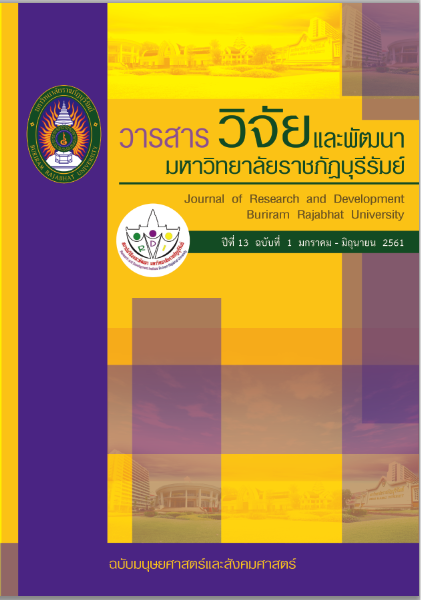Behavior and Motivation for Staying in Hostels in Bangkok
Main Article Content
Abstract
Based on the statistics of the number of hostel accommodation in Bangkok, the business was growing quickly and more rapidly. Researchers had the objectives to study hostel guests’ behavior and motivation for staying at hostels in Bangkok in order to improve the business strategies to be more competitive. According to a survey of 385 Thai and foreign travelers, it was found that most visitors stayed at hostels more than 1 time, and mostly came with school friends as well as fascinating in social activities. For hostel motivation, there were 8 types of hostel guests’ motivated forces: 1) learning from inner passion and advertising of discounts 2) management and infrastructure facilities 3) providing hospitality and communication services. 4) accommodation atmosphere and price strategies 5) location and surrounding areas 6) guest party 7) room size 8) free breakfast. The hostel motivation factors affecting the frequency, length of stay and guests’ spending were the appropriate hostel organization and design construction of the hostel, the development of social party to connect hostel guests’ relationship, and providing free breakfast. Problems in hostel services were efficiency of Wi-Fi, room cleanness and breakfast’s taste and quantity
Article Details
เนื่อหาและข้อมูลในบทความ เป็นความรับผิดชอบของผุ้แต่ง
บทความในวารสารเป็นลิขสิทธิ์ของวารสารวิจัยและพัฒนา มหาวิทยาลัยราชภัฏบุรีรัมย์
References
2. ธนาวุฒิ ศุภางคะรัตน์. (2552). ปัจจัยทางการตลาดที่ส่งผลถึงพฤติกรรมของนักท่องเที่ยวชาวต่างชาติ ในการเข้าพักโฮสเทลในเขตกรุงเทพมหานคร. (ปริญญาโท), มหาวิทยาลัยนเรศวร.
3.นราศรี ไววนิชกุล, &ชูศักดิ์ อุดมศรี. (2549). ระเบียบวิธีวิจัยธุรกิจ. กรุงเทพฯ: สำนักพิมพ์แห่งจุฬาลงกรณ์มหาวิทยาลัย.
4. นิศา ชัชกุล. (2550). อุตสาหกรรมการท่องเที่ยว. กรุงเทพฯ: สำนักพิมพ์แห่งจุฬาลงกรณ์มหาวิทยาลัย.
5. ไพศาล ทองคำ. (2551). พฤติกรรมและความต้องการเลือกใช้บริการที่พักแรมของนักท่องเที่ยว กรณีศึกษาบริเวณอ่าวนาง จังหวัดกระบี่. (บริหารธุรกิจมหาบัณฑิต สาขาการตลาด), มหาวิทยาลัยราชภัฎภูเก็ต.
6. ศูนย์วิจัยด้านการตลาดการท่องเที่ยว. (2558). สถานที่พักแรมในประเทศไทย. เข้าถึงได้จากhttps://intelligencecenter.tat.or.th:8080/apex/f?p=1:19:0 (1 กุมภาพันธ์ 2560)
7. สุรางคนา จามรสวัสดิ์. (2014). ความสัมพันธ์ระหว่างลักษณะทางประชากรศาสตร์ พฤติกรรมของนักท่องเที่ยว และส่วนผสมทางการตลาดที่มีผลต่อการตัดสินใจเข้าพัก ของนักท่องเที่ยวชาวต่างชาติ : กรณีศึกษา ธุรกิจโฮสเทล อำเภอเมือง จังหวัดกระบี่. Dusit Thani College Journal, 8(2).
8. สำนักงานสถิติแห่งชาติ (2557). การประกอบกิจการโรงแรมและเกสต์เฮ้าส์ ปี 2557. เข้าถึงได้จาก https://service.nso.go.th/nso/nsopublish/themes/files/questExce57.pdf. (1 กุมภาพันธ์ 2560)
9. สำนักงานสถิติแห่งชาติ (2560). จำนวนนักท่องเที่ยวต่างประเทศที่เดินทางเข้ามาในประเทศไทย พ.ศ. 2545 - 2556. เข้าถึงได้จาก https://service.nso.go.th/nso/web/statseries/statseries23.html. (1 กุมภาพันธ์ 2560)
10. Hecht, J.-A., & Martin, D. (2006). Backpacking and hostel-picking: an analysis from Cannada. International Journal of Contemporary Hospitality Management, 18(1), 69-77.
11. Lawson, R., Tidwell, P., Rainbird, P., Loudon, D., & Dellar Bitta, A. (1999). Consumer Behaviour in Australia and New Zealand. Sydney: McGraw-Hill Inc.
12. Leslie, D., & Wilson, J. (2006). The backpacker and Scotland: A market anlysis. An International Multidisciplinary Journal of Tourism, 1(2), 11-28.
13. Loker-Murphy, L., & Pearce, P. (1995). Young budget travellers: Backpackers in Australia. Annals of Tourism Research, 22(4), 819-843.
14. Nunnaly J. C. (1978). Phychometic Theory. New York: McGraw-Hill.
15. Nash, R., Thyne, M., & Davies, S. (2006). An investigation into customer satisfaction levels in the budget accommodation sector in Scotland: A case study of backpacker tourists and the Scottish Youth Hostels Association. Tourism Management, 27, 525-532.
16. STATISTIC BRAIN. (2017). Internet Travel & Hotel Booking Statistics. Retrieved from https://www.statisticbrain.com/internet-travel-hotel-booking-statistics. ( 20 July 2017)
17. Xiaolu Sun, Philip Wang, Lepp, A., & Robertson, L. (2014). Symbolic Consumption and Brand Choice: China’s Youth Hostels for the International Travel Market. Journal of China Tourism Research, 10, 15-68.


